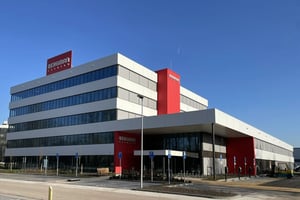Wageningen University & Research is developing a roadmap to significantly increase future agricultural yields through an EU project called CropBooster-P. This is set to eventually double food production worldwide, which is needed to continue feeding the growing global population while at the same time mitigating the effects of climate change.
Experts have been saying for some time that it is theoretically possible to feed 10 billion people by 2050. However, we will need to see a number of changes first, including a shift in our current dietary patterns (less meat and more plant-based foods), reducing food waste, the introduction of new food production methods such as permaculture and agroforestry, and, finally, the development of new agricultural crops with the highest possible nutritional value and quality – crops that also require smaller quantities of water and soil minerals.
René Klein Lankhorst, programme developer at Wageningen University & Research and coordinator of the CropBooster-P project, estimates that agricultural yields will need to increase by between 70% and 100% over the longer term. “That’s a huge challenge, especially as we need to make do with the farmland already in use. Cutting down the rainforest to create new agricultural land is not an option, as that would involve destroying the world’s ecosystem.”
From fossil to bio-based raw materials
And that’s not even the whole story, as the reality of climate change is forcing the world to switch from fossil to bio-based raw materials, which will increase demand for agricultural products by another 30%, Klein Lankhorst explains. “Not everyone is aware at this point that we will need enormous quantities of biomass in the future to provide industries with alternative raw materials. The challenge that involves cannot be overestimated. A total of eighteen European partners have therefore been commissioned by the EU to create a roadmap for the development of these new crops, spearheaded by Wageningen University & Research.”
Klein Lankhorst does not doubt the technical feasibility of the project. In fact, he is convinced that it will be possible to double European agricultural output by 2050. “Current agricultural crops convert an astonishingly low percentage of sunlight into plant biomass: between around 0.5% and 1%. If we manage to double this rate to between 1 and 2%, we’re good to go,” he says. “It’s been scientifically proven that it is possible. But it’s not just about photosynthesis; these improved crops will also need to be extremely water-efficient and efficient in the use of minerals such as nitrogen and phosphor. Also, an increased yield should not affect the quality and nutritional value of the crops. All this does mean that a lot of additional research will need to be done before we can make this happen,” the scientist says.
Working with the public
The aim of the CropBooster-P project is to pave the way for long-term research into all current and future options to increase crop yield. However, since the practice of genetically altering plant species has been known to attract public controversy, the scientists are on a mission to garner as much support for their project as possible. Klein Lankhorst: “Certain sections of society oppose the use of modern technologies in plant breeding, likely because these people feel their objections and doubts regarding new technologies are being ignored. CropBooster-P will therefore be involving the public from day one by sharing with them our roadmap for future-proofing our crops. We plan to do this by organising a large number of workshops in which we will discuss the current challenges facing the agricultural sector with consumers, industry and farmers.”
New market opportunities
NPM Capital portfolio company HAK has launched a successful campaign to promote the consumption of vegetable protein. As the Dutch market leader in freshly processed vegetables and legumes, HAK aims to encourage consumers to eat more of these foods as an alternative to meat, which many Dutch household continue to consume daily. HAK Marketing and Innovation Director Nicole Freid: “This means we produce tasty and easy-to-prepare foods and legumes, which have a positive impact on consumers’ health and a minimal negative impact on the planet.” It was based on this strategy that HAK joined the Green Protein Alliance (GPA) two years ago, a partnership of food-industry trailblazers with the shared goal of increasing the consumption of ‘green’, healthy and sustainable protein products. As well as being better for humans and the environment, this also creates new market opportunities, according to GPA members. The initiative is supported by the Dutch government and various experts in nutrition, health and the environment.
Also read: ‘The Netherlands helps feed tomorrow’s world’



.jpg?width=448&height=200&name=cybersecurity-privacy-protect-data%20(1).jpg)









